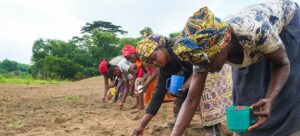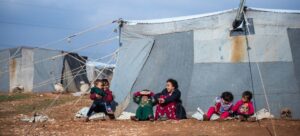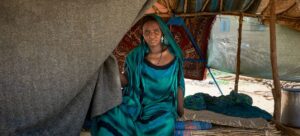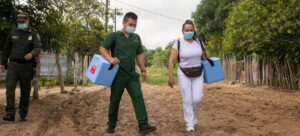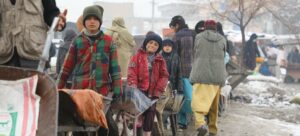“At this moment, we need the global community – and this Council – to put their hands on the wheel of progress, provide resources, and prevent Afghanistan from spiraling any further,” he said.
Mr. Guterres also outlined action for the de facto rulers of the country, the Taliban, calling on the fundamentalists to expand opportunity and security for Afghans, uphold human rights, and demonstrate real commitment to be part of the international community.
A moral responsibility
The Secretary-General said Afghanistan has long been unfairly used as a platform for political agendas, geopolitical advantage, ideological dominance, brutal conflicts and terrorism.
“As a matter of moral responsibility – and regional and global security and prosperity – we cannot abandon the people of Afghanistan.”
Afghans need peace, hope, and help, and they need it now, he said.
The country’s economy is collapsing amid another brutal winter, and daily life has become “a frozen hell”. Over half of all citizens are facing extreme levels of hunger, and some families have been forced to sell their babies so they can buy food.
Meanwhile, sanctions and mistrust by the global banking system have frozen nearly $9 billion in central bank assets, and vital systems are starved of much-needed funds.
As the economy spirals downward, human rights are also losing ground. The UN chief highlighted the situation of women and girls, who are once again shut out of offices and classrooms. He also appealed for the release of women activists who were arrested or abducted recently.
Mr. Guterres reminded the Council that earlier this month, the UN launched a more than $4.4 billion appeal for Afghanistan to keep the food, education and economic systems from collapsing.
He urged countries to suspend rules and conditions that constrict both the Afghan economy and lifesaving humanitarian operations.
Accountability for cash
“At this moment of maximum need, these rules must be seriously reviewed,” he said, emphasizing the need to pay public service salaries. He also welcomed the Council’s recent adoption of a humanitarian exemption to the UN sanctions regime for Afghanistan.
The Secretary-General underscored the need to “jump-start” the Afghan economy through increased liquidity, including by freeing-up frozen currency reserves and through cash injections.
“Our team in Afghanistan stands ready to work with Member States and others to establish accountable systems to ensure that funds go to the Afghan people most in need, and are not diverted,” he said.
Plea to Taliban
The UN chief also urged the Taliban to demonstrate real commitment to be part of the international community. “The window for trust-building is open. But this trust must be earned,” he said.
Afghanistan has been a fertile breeding ground for terrorist groups for far too long, and the UN chief underscored the critical need to promote security and fight terrorism.
“If we do not act and help Afghans weather this storm, the region and the world will pay a heavy price,” he said, urging the de facto authorities to work together with the global community to suppress the terrorism threat.
“We must prevent the expansion of all terrorist organisations in the country. And just as I appeal to the international community to step up support for the people of Afghanistan, I make an equally urgent plea to the Taliban leadership to recognize and protect the fundamental human rights that every person shares.”
He further encouraged the Taliban “to seize this moment and garner international trust and goodwill by recognizing – and upholding – the basic human rights that belong to every girl and woman.”
New plan for Afghanistan
The UN has kept its commitment to remain in Afghanistan to deliver support, alongside aid partners, reaching some 18 million people last year.
On Wednesday, the UN team in the country launched the One-UN Transitional Engagement Framework (TEF), a $3.6 billion plan to save lives and sustain health, education and other essential services throughout 2022.
Special Representative Deborah Lyons, head of the UN Assistance Mission in Afghanistan (UNAMA) said this investment aims to reverse the steady increase in poverty, while ensuring critical donor funds are not diverted or misused.
‘Pathway’ to commitment
However, with donors “understandably reluctant”, she hoped the Taliban would demonstrate commitment to a “pathway” towards future engagement with the international community.
“By ‘pathway’ I mean a series of clear, mutually understood commitments, with human rights at the forefront, which would result in Afghanistan rejoining the community of nations by securing domestic legitimacy that aligns with Afghanistan’s modern history and the aspirations of its population, its multi-ethnic character, and its traditional Islamic identity,” she said.
Ms. Lyons reported that the de facto authorities have taken some steps to function more effectively as a government, including agreeing a budget fully financed by their own revenues. Although senior Taliban officials have met with ethnic minority representatives, greater inclusion in governing structures is yet to be seen.
‘Environment of intimidation’
“On the other hand, here on the ground there is compelling evidence of an emerging environment of intimidation and a deterioration in respect for human rights,” she said, speaking from the capital, Kabul.
“This suggests that the consolidation of government authority may be leading toward control of the population by fear, rather than by understanding and responding to its needs.”
Despite Taliban announcements of general amnesties for former Government workers, or those who defended the regime, UNAMA continues to receive credible allegations of killings, enforced disappearances and other violations. Detentions of political opponents, civil society representatives and others who voice dissent are also rising.
“And I must stress to this Council that we remain extremely concerned about the fate of several women activists who were abducted from their homes and have disappeared,” Ms. Lyons told ambassadors.
“No Afghan should live in fear of a knock at their door in the night and no family should be left to wonder about whereabouts and fate of their loved ones.”

© UNICEF/Omid Fazel
Women and their daughters receive winterization kits from UNICEF in Afghanistan. The kit includes flour, rice, blankets, warm clothes, tarpaulin, and water buckets.
Demonstrating commitment
To demonstrate commitment to governing based on trust, and not fear, the Taliban must first initiate a wider dialogue towards national reconciliation, she said, a process that must be entirely initiated and shaped by Afghans.
The de facto authorities must also deliver on their commitment to girls’ education, she continued, welcoming recent statements that girls of all ages will be educated nationwide.
The promise to contain terrorist groups must also be followed with more meaningful actions, though Ms. Lyons suggested “a certain amount of realism” will be required here.
“Given the common interest in addressing this threat, if sufficient trust can be established this could be an area for potential cooperation between the international community and the de facto authorities,” she said. “A new conversation, a new dialogue on this is warranted.”






